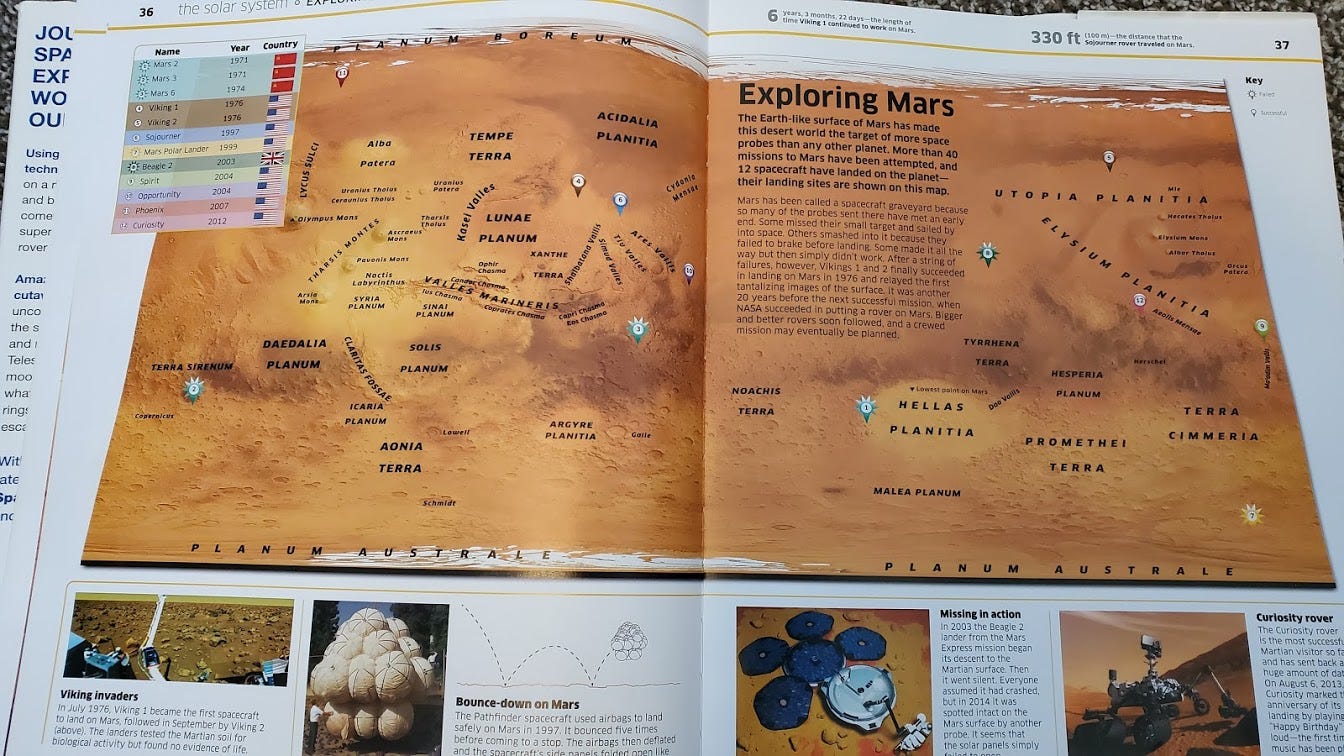Taking The Long-Term View
Product Thinking and Mars Colonies
On February 18, NASA landed the Perseverance rover on Mars. It was amazing to watch, as many of you probably did. I consistently geek out over rocket launches, probes, and rovers. In this case, we shot a rocket at another planet, then right on time sent a car down to the planet, literally using a sky crane to lower it onto the surface, all from Earth. If that’s not incredible, I don’t know what is.
Perseverance will continue to explore Mars, looking for signs of ancient life. It is paving the way for eventual human exploration of Mars. The more we understand about the journey, the planet itself, and what it will take to send people, the sooner we can start and the more likely we’ll be successful.
Space exploration has generally been about long-term thinking. It takes a long time (speaking in terms of our software-driven world) to plan and execute missions that send robots or rockets or probes to other worlds. And the payoff is extremely uncertain. You fail a lot.
Below is a picture from one of our family’s favorite books about space. It shows all the attempted missions to Mars. Over 40 now. And only 12 (now 13 with Perseverance) have been successful. It’s easy to forget, now that we’re pretty good at landing cars on other planets, that we used to suck at this sort of thing.
And when you succeed, it takes years to see the results. And even then, it may be the next generation that gets to enjoy the fruits of the labor. Think about what we’re trying to do. The goal is human missions to Mars and beyond. That may be soon, or it may be further out still. But we’re laying the groundwork to make it happen. Without that, we’ll never have a human mission to Mars. Or to further reaches of the solar system.
Most of the people involved early in space exploration didn’t and won’t get to see how far we’ve come. That’s the same for many taking part now.
SpaceX has the vision of a human colony on Mars. Elon Musk wants to spread humanity beyond Earth, and that starts on Mars. It’s a bold and exciting vision. It will take an incredible amount of technology and ingenuity to make it happen.
Who will ultimately be the beneficiary of that? I’m not sure. At this point, it’s so experimental that it’s hard to imagine that it’s anything but dangerous. But as we get better at it, what are the possibilities? Could we reach further into the solar system? Tap unknown resources? Lower the risk of human extinction? Some very long-term benefits, but a lot of risk in the short term.
So what does all of this have to do with product thinking, our work, and those of us not planning on going to Mars?
We get so caught up in the short term that we frequently lose sight of the long term. It happens to companies, product teams, and individuals.
Companies become obsessed with the fiscal year, or the next quarter, or the big project or feature. We only care about driving performance for what’s in front of us with little care about what is down the road or how our work now will impact our team or company or society three years down the road.
Some of us anyway.
It’s easy for companies to fall into this trap. Why focus on five years down the road when we need to focus on quarterly earnings? Why worry about next year when investors care about returns now?
Even attempts to fix the principal-agent issue and make people feel long-term ownership go awry because the incentives are often too short term. If they base my bonus on performance this year, why would I look beyond this year?
But these are huge issues, because they incentivize too many people to focus on short-term problems and short-term fixes rather than long-term answers.
There’s nothing wrong with being profitable this quarter, but it’s a massive issue to do it at the expense of next year or next decade. Yet that is what so many companies and teams do. Reaping as much as they can now, sowing little for the future.
It happens to product teams too. We get caught up in delivering features and creating code that we never stop to figure out what our products and experiences should look like. That includes now and in the future. We forget about all the discovery work we need to do to inform our decision-making. What trends are shaping the world? What will your industry look like next year? In five years? In ten? What can you do now to prepare for that? Or better yet, to shape the trends?
As individuals, we let ourselves fall victim to short-term thinking as well. We trade long-term joy for short-term pleasure. It’s easier to watch Netflix than invest time on a new skill. Especially if that skill won’t pay off for years. It’s easier to skip exercising, especially when we can’t see the benefits for weeks or months.
What To Do
The essence of Product Thinking is focusing on the holistic picture, the reason why we’re doing something, the long-term.
It’s difficult to justify sacrificing something good now unless we keep that in mind. Why give up quarterly profits now? Why take a chance on a risky product in the short-term? Why live uncomfortably, whether on Mars or here on Earth?
Our kids recently saw videos of other kids doing the “marshmallow challenge”. It’s from an old psychology experiment where researchers gave children an opportunity to eat a single marshmallow now, or wait until the researcher returned, upon which the child could eat two marshmallows.
Parents have done variations of this with their kids, and our kids wanted desperately to try it. So we gave them treats, told them they could eat the treat now, or wait until we came back, and then they could have twice the treat. They’re smart kids. They easily waited and got twice the treats.
I wish we could replace some leaders with kids like that: willing to give up immediate payoffs in exchange for a longer-term payoff.
But you have to have a vision for what you’re doing. Creating a colony on Mars. Building an Everything Store. Making the best app available. Without that, it becomes too easy to gobble up the marshmallows in front of us now.
Why Explore?
So why do we explore space? Why do we push ourselves to go to the moon, go to Mars, live in space stations, etc?
We do it to push the boundaries of human knowledge and experience.
Where we push the boundaries, magic happens. It forces innovation, which produces residual benefits down the chain. There have been many residual benefits, but we don’t do it for the residual benefits. Genuine progress and growth happens on the boundaries. But also creates real benefits by furthering human advancement. Through understanding of our universe. Through driving further exploration of our universe.
We don’t need more companies simply maximizing quarterly revenue. We don’t need more shortsighted MBAs. We don’t need more teams just incrementally adding product features. We don’t need more individuals just getting by.
We need people pushing boundaries.
We don’t get to Mars by setting our sights on incremental revenue. That may be a step along the way. But we have to have our set our vision much higher than that. And expect to create a portfolio of bets (along with a portfolio of failures) that get us there.
We don’t all have to go to Mars. But in our own ways, we can all create the means to push our boundaries.
Good Reads and Listens
The Best and Worst Elements of Being a Product Manager or UX Designer (podcast) - Product & UX can be great. But it can also suck. In this episode, we discuss the best and worst elements of working in product management and design. From the highs & lows, we tackle the reality of our favorite (& least favorite) parts of the job.
Long-Term Thinking (article) - Too often we reward people who solve problems while ignoring those who prevent them in the first place.
The State of VR Right Now (podcast) - I started dabbling in VR a few years ago with Samsung Gear VR and Google Daydream, and I’m ready to go in again now that it has matured quite a bit more. This was a good podcast on where the technology is now.






